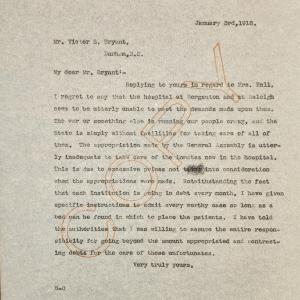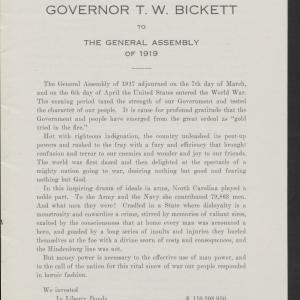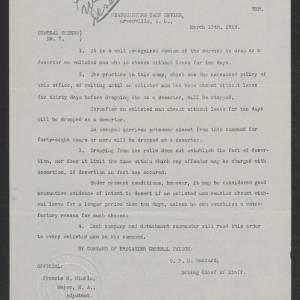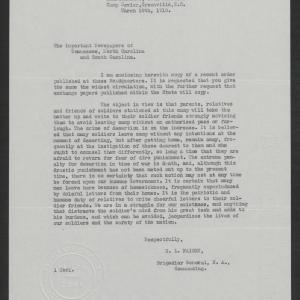T. L. KIRKPATRICK RECEIVES REBUKE
Maj. Langston Wires Charlotte Board Member Who Starts Public Criticism
NOTHING MORE HARMFUL SAYS MAJOR LANGSTON
Major Langston Had Given Out Interview on Eastern Board
Col. T. L. Kirkpatrick, of Charlotte, member of the Charlotte exemption board, who gave out for publication in Charlotte criticism of the reclassification of registrants by the district exemption board at Statesville yesterday received a sharp rebuke from the State headquarters in a telegram which Major John D. Langston sent him, telling him that “nothing can be more harmful than public criticism by one official of another charged with similar duties.”
Col. T. L. Kirkpatrick’s criticisms were embodied in an interview which he gave a Charlotte newspaper man and which appeared in the Charlotte Observer of April 5. In that interview, Col. Kirkpatrick announced that the local board would not be responsible for changes which the district board made in the classification of registrants.
Major Langston’s telegram to him yesterday follows:
“Your action in making a public attack through the press upon another official connected with the draft is unfortunate and most unwise. Officials should be fearless, and not seek by publicity to encourage dissension and discontent among registrants by charging responsibility for classification to other officials. Cases of registrants who married since May eighteenth were appealed to District Boards by order of the Provost Marshal General, and no discretion in these appeals was left in the Government Appeal Agents. Nothing can be more harmful than public criticism by one official of another charged with similar duties. You should make every effort to correct any wrong impression created by your interview.
"LANGSTON.”
Colonel Kirkpatrick’s Interview.
The interview which drew Major Langston’s letter follows:
“A ‘vigorous protest’ to Governor Bickett against the action of the district exemption board at Statesville, which was described as ‘arbitrary and unreasonable,’ was forwarded yesterday by Col. T. L. Kirkpatrick, chairman of the Charlotte exemption board. The protest grew out of the action of the district board removing registrants for the draft from Class 3, in which they had been placed by the city board, and placing them in Class 1, it was explained. The action, said Colonel Kirkpatrick, seemed to him to be based upon an interpretation of the selective service regulations which was not intended to be made by the President when the regulations were promulgated. Colonel Kirkpatrick declared himself to be thoroughly aroused over the matter, and expressed his determination to request Senators Simmons and Overman to take the matter directly to the War Department, should the Governor be unable or unwilling to afford relief from the action of the district board.
“The chairman explained that at the bottom of this matter may have been unsatisfactory filling out of questionnaires, the blame for which was not attached entirely to registrants but partly also to those who had agreed to assist the registrants in filling out the complicated blanks. As a result of incomplete information being supplied, said Colonel Kirkpatrick, it was considered advisable for the board to personally investigate a large number of cases, which was done. Upon findings in such inquiries, the board classified the registrants with respect to dependents and as to industrial qualifications.
“A number of men who had married since May 18, 1917, when the act of Congress authorizing the selective service was passed, were placed in Class 3, said Colonel Kirkpatrick, because it was established to the satisfaction of the board that in these cases the registrant did not marry in the hope of escaping the draft. He defended action of the city board in the statement that this attitude was in keeping with the spirit of the regulations, as promulgated by the President. And, he said, this is the point wherein the city board and the district board are so widely at variance, for the district board reclassified a number of these cases and placed the registrants in Class 1.
“A certain number of these cases were summarily appealed to the district board by the Charlotte appeal agent, probably at the request of the board, said the chairman. In this reported request, described as ‘summary and arbitrary,’ Colonel Kirkpatrick declared in his opinion the district board is ‘out of order,’ inasmuch as his construction of the selective service regulations is that the President did not intend that the district boards should pass upon the question of dependents in such cases, especially after the local boards had personally and thoroughly investigated the individual cases before deciding upon classification. Section 104 of the regulations provides, however, that the appeal agent may appeal from any decision of any local board at any time, as was shown by reference to the regulations.
“Chairman Kirkpatrick admitted that, according to the letter of the law, ‘but not according to the spirit of the law,’ the appeal agent was within his authority. In this connection, he declared he knew the President ‘does not intend for married men to fight this war unless the situation grows far worse than it now is, and if it can be avoided.’ In cases where men married plainly with the hope of escaping the provisions of the regulations, Colonel Kirkpatrick declared he clearly was aware of the duty of the board to disregard, in accordance with the regulations, the status of such registrant with respect to dependents. ‘But,’ he said, ‘in cases where men married after May 18, 1917, certainly without thought of the effect of the draft regulations but in keeping faith, the registrant should be accorded the privilege of others of the same status, with respect to dependents, though becoming of that status prior to the date mentioned.’
“In this connection, Colonel Kirkpatrick cited the case of a young man and young woman who, he said, were well known to him, and who had been sweethearts for several years. Because of the young man’s financial circumstances, their marriage was delayed and his business connections became such after the draft regulations became effective that he was enabled to provide for a wife and they were married. This young man had been placed in class 3 by the city board and recently had been re-classified and placed in class 1 by the district board on the grounds that the marriage date was after May 18, 1917. Numerous other identical instances were found during the inquiries by the city board, said the chairman, resulting in the registrants involved being placed in class 3 by the city board, which the district board later placed in class 1.
“‘Tell the public for me,’ said Colonel Kirkpatrick, ‘that the Charlotte board assumes no responsibility for classification of registrants whose questionnaires are requested by the district board and which are returned with a new classification made in red ink'.”




